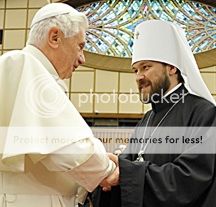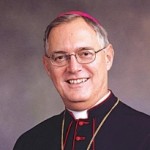
Pope Benedict XVI & Archbishop Hilarion
I mean all due reverence when I say that I have been a fan of Metropolitan Hilarion Alfeyev (his site has been in my blogroll for as long as Archbishop Dolan’s, at least) for some little while.
As a musician/composer/scholar/monk he rings my maternal bell by reminding me of my own sons. Like Pope Benedict XVI, he is a brilliantly gifted man and prolific writer, who is nevertheless an accessible joy to read.
The lack of taste for solitude and silence is one of the most common illnesses of the modern person. Many are even scared of remaining in stillness, being alone or having free time: they feel more comfortable being constantly occupied; they need words, impressions; they always hasten in order to have the illusion of an abundant and saturated life. But life in God begins when words and thoughts fall silent, when worldly cares are forgotten, and when a place within the human soul is freed to be filled by Him.
–Prayer and Monasticism in Orthodox Tradition
Hilarion and Pope Benedict (also a musician and scholar, with a monkish bent) seem to be of one mind on many things:
Benedict XVI will soon create a new “pontifical council” expressly dedicated to the “new evangelization.” Not for mission countries where the congregation “de propaganda fide” is already at work. But for the countries of ancient Christian tradition that are today in danger of losing the faith . . . Meanwhile, one great ally has already united with the pope from outside of the Catholic Church, in this enterprise of a new evangelization.
This great ally is the Russian Orthodox Church.
. . .Metropolitan Hilarion of Volokolamsk, said exactly this to the pope: that the Catholic Church will not be alone in the new evangelization of dechristianized Europe, because it will have at its side the Russian Orthodox Church, “no longer a competitor, but an ally.”
The positive relationship that has been established between the Russian Orthodox Church and the Church of Rome is one of the most stunning achievements of Benedict XVI’s pontificate. It is also stunning for its rapidity. In fact, it’s enough to look back just one decade to note the chill that dominated between the two Churches.
[…]
One proof of how much closer the positions of the heads of the two Churches have become is given by two books published just a few months apart, and without precedent in history.The first was published last December by the patriarchate of Moscow, and presents in Russian and Italian the main writings by Ratzinger on Europe, before and after his election as pope, with an extensive introduction written by Metropolitan Hilarion.
The second, released a few days ago, is published by the Libreria Editrice Vaticana and collects writings by Kirill before and after his nomination as patriarch, on the dignity of man and the rights of the person, with an introduction by Archbishop Gianfranco Ravasi, president of the pontifical council for culture.
Institutionally, co-operation in the dissemination of media is always a sign of serious intent toward a strengthening of alliances. On a personal note, Hilarion and Benedict seem to enjoy a warm friendship.
Both Benedict XVI and Metropolitan Hilarion are utterly convinced that Christian art is also a vehicle of evangelization and a leaven of unity between the Churches.
Before arriving in Rome to meet with the pope, Hilarion stopped in Ravenna, Milan, Turin, and Bologna. The first of these cities was the capital of the Eastern Christian empire in Italy, and its basilicas are a marvelous testimony to this. In his conference on May 19, Hilarion said that he had admired in the mosaics of Ravenna “the splendor of a Church in harmony, not yet wounded by the division between East and West.” And he added: “If this harmony was real for our ancestors, it can be real for us as well. If we are not able to recreate the harmony evoked by the mosaics of Ravenna, the blame will be ours alone.”
Roman Catholics should make a point of getting to know Archbishop Hilarion of Volokolamsk. He is going to be a big part of our future. And far from being an insulated aesthete, he is quite aware of the world.
Meanwhile, hooray for the pope’s desire to re-evangelize the “countries of ancient Christian tradition,” even as he also reaches out to the Anglicans. His visit to Cyprus, scheduled for next week, has raised the hopes of the Maronite community.
Read also: Storm Clouds in the Ukraine by George Weigel, on the home page!











